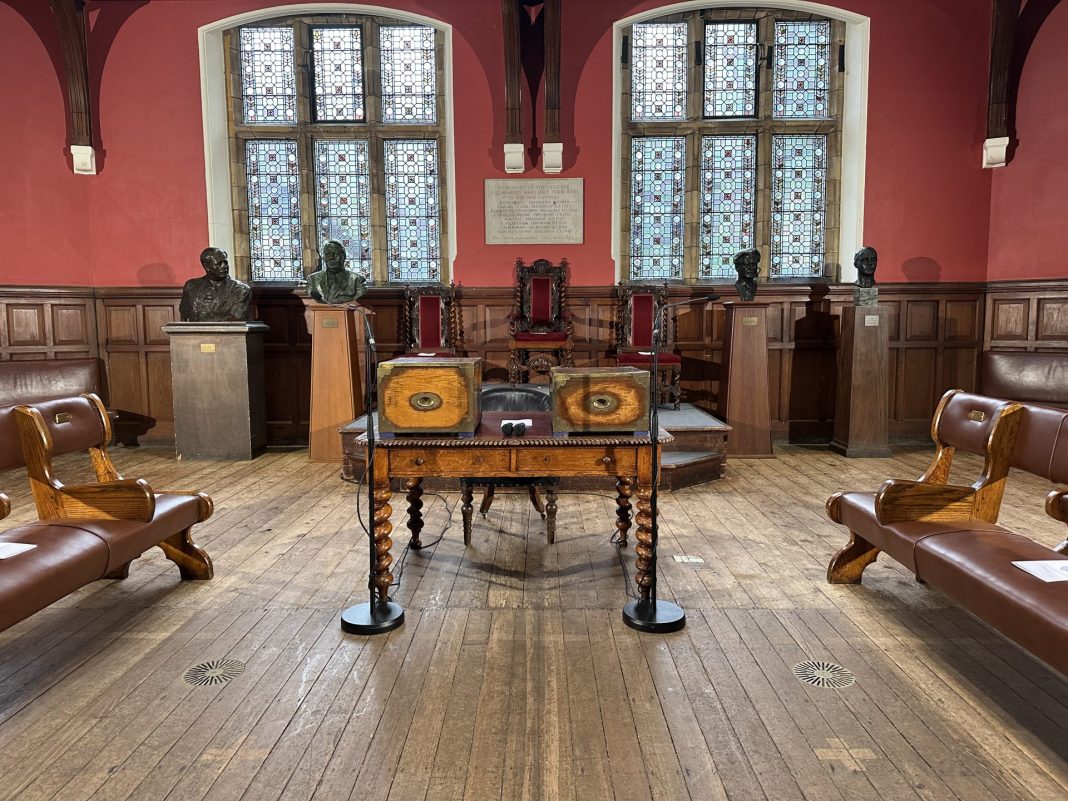The Oxford Union last night debated the motion “This House Believes Trump has gone too far,” featuring controversial American conservative activist Charlie Kirk on the opposition. At the end of the debate, 250 members voted in favour of the motion and 92 voted against.
Opening for the proposition was Union Librarian Anya Trofimova. Trofimova took aim at President Trump’s first 100 days in office. She criticised the US president’s foreign policy, stating that he has “bankrolled Israel’s Gaza genocide”. Trofimova also pointed to Trump’s domestic programme, describing how he has “tanked the American economy,” warning that “this is just year one” of his second term.
Vishnu Vadlamani, member of the Union’s Secretary’s Committee, opened for the opposition. In a slightly convoluted manner, Vadlamani argued that Trump was demonstrating to Europe and America the consequences of voting for the “radical right”. He also queried what the boundaries implied by the phrase “too far” were and sought to remind the chamber of the mandate produced by Trump’s electoral victory. He too criticised Trump, but argued that the president is a symptom of a deeper “malaise” in American liberal democracy and the Republican Party. Vadlamani said: “The real issue is not Trump himself, but the political climate that enabled his rise.”
The second speaker for the proposition was Serene Singh, a Criminology DPhil candidate. She broke down the negative impacts of the Trump presidency into three catchily alliterative categories: “division”, “distraction”, and “deflection”. Singh used a bit of theatre to illustrate her point about distraction tactics. She pointed out three people sitting on the floor at the back of the room, positioned there ahead of time. She said that just as attendees had up to that point ignored those people, the world was ignoring the Trump presidency’s negative impact.
Next for the opposition was Regent’s Park College student Daniel Ogoloma, who like Vadlamani alleged that the term “too far” was excessively vague. Addressing the accusation that Trump has disregarded the Constitution, Ogoloma argued that the president was in fact following it “forcefully and faithfully”. Ogoloma brought up the example of the deportation of Kilmar Abrego Garcia to El Salvador, which the U.S. Supreme Court has ruled to be illegal. He argued that this was an example of the courts successfully balancing executive power. The Trump administration has not facilitated Abrego Garcia’s return to the US, despite having been told to.
Following this, speeches were taken from the floor, two each for proposition and opposition. Students arguing for the proposition claimed that Trump has flouted both democratic values and the US Constitution. Those arguing against spoke of Trump encouraging Europe to build up its armed forces and combat institutional “stagnation”.
The final speaker for the Proposition was Laura Smith, a presidential historian at Oxford’s faculty of History. Smith cast doubt on Trump’s electoral mandate, calling attention to criticism of the concept within political science. She compared Trump several times to President Andrew Jackson, who was impeached like Trump. She argued that unlike in Jackson’s time, America is not a “democracy of the white man”, also noting the difference in gender between the proposition and opposition benches. Shortly before the end of her remarks, she joked about Kirk taking notes on a sheet of paper. Kirk responded: “you’re going to love it.”
Beginning his remarks as the final speaker for the opposition, Kirk sought to undermine his opponents’ arguments by pointing to factual inaccuracies. He noted that Abrego Garcia was not a US citizen. Answering concerns around Trump’s association with the European far right, Kirk said: “I certainly hope Reform and AfD wins.”
Kirk spent the bulk of his prepared remarks attacking the records of successive British governments. He called ‘Make America Great Again’ a project to “return America to its British roots” but said that British leaders had abandoned the principles that “made them great in the first place”. He referred to the “dying out of the British nation”, and of Christianity, attributing this to immigration to the UK. Kirk added: “Soon, Britain will have more practising Muslims than practising Christians […] I don’t want Americans to be replaced.”
For the remainder of his time, Kirk spoke about DEI, calling it a “cancer”, and referring to “DEI parasites”. He praised Trump for taking measures to combat DEI, as well as what he called the “toxic social contagion of transgenderism”. He concluded by telling the chamber: “If you want a Britain you can be proud of, you should all be wearing MAGA hats.”
Before attendees left the chamber, Union President Anita Okunde called for a moment of silence to mark the recent death of Joseph Nye. Nye, an American political scientist, was originally going to be the lead speaker for the proposition.


